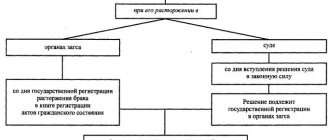The process of divorce begins by filing an application from one or both spouses to the registry office or court. Complex divorces with disputed marital statuses are dealt with in court.
Today, divorces in Russia have a high percentage, so judges are taking measures to possibly save the marriage. In order for the spouses to fully consider the decision, the court sets aside a period for reconciliation during a divorce.
When a judge is required or may provide a time limit for conciliation
And another important question: does the judge have restrictions, or can he decide this issue arbitrarily?
Issues of divorce of spouses through the court are regulated by Articles 16 - 26 of the Family Code of the Russian Federation (FC RF). Article 22 (paragraph 2) states the following:
When considering a divorce case in the absence of the consent of one of the spouses to dissolve the marriage, the court has the right to take measures to reconcile the spouses and has the right to postpone the hearing of the case, assigning the spouses a period for reconciliation within three months. Divorce is carried out if measures to reconcile the spouses are unsuccessful and the spouses (one of them) insist on dissolution of the marriage.
INUSTA
As we see, the court gives the spouses time to think, during which they must weigh the pros and cons of divorce when the husband, wife, or both of them ask the court to do so . The request in the form of a statement or petition must be made during the court hearing or at any time before the hearing by submitting the appropriate paper to the office of the court district.
But this article provides for the right of the judge to provide a period for reconciliation of the spouses even without the request of one of the parties. The court can do this if it finds it necessary in connection with the circumstances of the case. For example, if the plaintiff behaves insecurely, the explanations are vague, and does not give clear explanations about the reasons for the discord in family life.
In exactly the same way, the court has the right to give a period to think, to weigh all the pros and cons, when the other party, although does not declare the possibility of reconciliation, does not ask for a period for this, but simply declares that it does not want to get a divorce.
Thus, the period for reconciliation of the parties is provided:
- at the request of the husband, wife;
- at the initiative of both parties;
- if you disagree with the divorce;
- at the initiative of the court - for other reasons.
Grounds for setting a conciliation period
In accordance with paragraph 2 of Art. 22 of the RF IC, the defendant’s desire to save his family is a key basis for assigning a conciliation period. The corresponding desire of the second party can be brought to the court both orally and in writing.
The court carefully examines what kind of relationships take place in a disintegrating family. The study process is carried out both in preparation for the trial and directly during it. In particular, the reasons for the divorce proceedings set out in the statement of claim are subject to careful analysis.
The following factors are also taken into account:
- organization of joint recreation;
- how often do family scandals occur?
- how relationships are built when solving everyday issues (cooking, washing, cleaning, etc.);
- who exactly acts as the initiator;
- with whom the young children will live after the divorce;
- how the property will be divided;
- financial capabilities of each spouse;
- mental state of both spouses, etc.
Witness testimony is also important. First of all, we are talking about immediate relatives and neighbors. A conciliation period is often appointed in the interests of minor children. It is important to understand that parental divorce is a psychological trauma for any child.
Many divorces happen not because the spouses lose feelings for each other, but because of banal everyday problems. If the judge sees that the family is able to begin to resolve such difficulties, then a conciliation period will be appointed.
One of the most common problems for many families is financial troubles. An example would be a situation where a spouse cannot find a job. If the judge sees that the defendant expresses a desire to find work in the near future, then a deadline is set for reconciliation.
If the judge sees that the plaintiff is not so firm in his decision and has obvious doubts, then again a conciliation period is appointed. No one guarantees 100% success after such a decision by the judge. Judicial practice knows many cases when the party that filed the claim continued to insist on breaking up the family even after three months of the reconciliation period.
There are also frequent situations when time to think leads to the desired results. We are talking about real reconciliation between spouses. If the parties reconcile, the plaintiff withdraws the claim and the divorce proceedings are terminated.
In what cases can you ask for reconciliation?
Upon filing a request for a time limit, the court must inquire about the reason for the request. Not every reason is considered valid. Let us assume that such a reason as the desire to simply annoy will be rejected by the court. Such grounds as the disagreement of the parties on other aspects of family life, be it a property conflict, a dispute over alimony, about a child, etc., will not be considered worthy of attention.
Perhaps the only worthy reason is the desire of the husband or wife to take specific actions aimed at family reunification.
That is, a motive such as, for example, “I don’t want to get a divorce because we didn’t have time to divide the marital property” is not allowed!
If you know that the defendant is simply delaying the case, try asking him what he intends to do with the deadline, that is, what he is going to do to reunite the family. To begin with, it’s not easy to come up with something right away. Perhaps the applicant will simply “split”, for example, talk about his selfish motives. Draw the judge's attention to this circumstance and ask him to record his words in the minutes of the meeting.
INUSTA
Duration of the term
The judge can set a time limit for reconciliation within three months . Often only one month is prescribed to see if there is a result. At the end of the short period, the judge may give another one to two months. Rarely does a court issue a ruling for 3 months at once.
What happens during the period of reconciliation
The judge cannot prescribe any measures or procedures that the divorcing persons must carry out. If such an appointment occurs, there is a gross violation of the law. But the law does not prohibit the judge from recommending these measures, for example, when the husband or wife himself requests it and there is a clear program of action.
The court does not control what happens during the reconciliation period. This means that in the end the spouses themselves determine what to do and whether to do anything at all.
If the husband and wife have reconciled and the family has been restored, the plaintiff has the right to withdraw the filed claim without waiting for the deadline to expire.
Pay attention to the article by our lawyers on the topic: Is it possible to reduce the already appointed period for reconciliation?
Court ruling on reconciliation period
The judge also has responsibilities in this case. The judge must motivate his decision (Article 225 of the Code of Civil Procedure of the Russian Federation), that is, write what prompted him to offer the parties to reconcile, why he thought that the family could still be saved or restored, what evidence led him to this. This judicial act must be drawn up in writing; you can obtain a copy of it. An oral determination is allowed, but then the judge must write the above in the minutes of the meeting, which can also be viewed.
The court cannot give a term if the defendant also wants a divorce and directly declares this to the judge.
Moscow, Varshavskoe sh., 46
INUSTA
Law firm
INUSTA
LEGAL SERVICES: COURTS, TRANSACTIONS, NEGOTIATIONS FREE LEGAL CONSULTATIONS
8
Order
Meanwhile, it should be said that judges quite often grant a term arbitrarily , without substantiating it in any way, in fact, “according to their mood,” and thereby violate the divorce procedure.
From the practice of our lawyers
Thus, in one of our cases we were faced with a gross violation of the plaintiff’s rights to timely consideration of the case. The lawsuit in the case indicated the actual breakdown of the family many years ago, the fact that the plaintiff already lives with another family, he has a child from another person and he intends to get married in the near future. Evidence of this was presented. The defendant ignored the lawsuit filed for divorce through the court. However, the judge provided the maximum possible period for reconciliation, which was 3 months. Since the Code of Civil Procedure of the Russian Federation does not provide for the possibility of appealing to a higher court the determination to provide a period for reconciliation of the parties, we had no choice but to file a complaint against the judge to the chairman of the court and to the qualification board of judges, and also to challenge the judge as incompetent in matters of law. Among other things, the reason for the complaints was the absence in the minutes of the meeting and the very definition of the reasons why the judge decided to give the parties a period of time for their reconciliation and did not take into account the arguments about the impossibility of restoring the family, and why he decided that it was necessary to give the maximum period.
Higher authorities did not bring the judge to disciplinary liability, but an inspection of his activities was ordered, the judge was forced to give explanations, and other aspects of his activities were checked. It is unlikely that the judge will want to “experiment” like this again next time.
INUSTA
In several other cases we supervised, where the defendants did not deign to appear at the hearing, the judges also provided time limits for reconciliation - as a rule, no more than a month . The judges were not interested in the fact that the defendant did not even know about it. Sometimes judges informally explained that this was their way of insuring themselves in case of a complaint against the decision in appeal or cassation. One of the judges has already had cases of such cancellations - the spouses reconcile and file complaints, blaming the court for treating the case without due care, and the higher courts support their arguments. Things did not require a speedy result - and we did not argue. Previously, in previous years, such practices were encountered much less frequently.
Thus, to the above, it should be added that if the other party does not support the divorce or even simply ignores the court process, the court may grant a period for reconciliation, indicating formal reasons.
If you have been given a period for reconciliation between the parties, you need to analyze the court’s ruling and appeal the judge’s actions if they are illegal, or correct the mistakes if the judge is right.
Objection to an application for a conciliation period
The plaintiff may file an objection to the conciliation period, but this must be done before the judge makes a determination.
The list of arguments set out in the objection may include:
- drunkenness;
- drug addiction;
- betrayal;
- systematic beatings;
- psychological pressure;
- threats to life or health, etc.
The presented arguments are considered valid in judicial practice. Lawyers recommend supporting them with certificates from the police or hospital. Audio and video evidence is also considered by the court.
Sample objection to an application for setting a conciliation period
The conciliation period appointed by the court can range from 1 to 3 months. If both parties are against its provision, then the court does not appoint it. If only the defendant is in favor of a conciliation period, the court considers his arguments. In this case, the defendant files a motion. The plaintiff may file an objection to the application for a conciliation period.
What documents are needed for divorce without the consent of the spouse?
If there are no children
- statement of claim;
- a copy of the claim for the defendant;
- receipt of payment of the duty (in the original);
- copy of the passport;
- a copy of the marriage certificate or certificate of its conclusion;
- certificate of the defendant’s place of residence.
All documents, except information about the state duty, are provided in copies. If the plaintiff does not plan to appear at the hearing and cannot show the original documents to the court for review, the court may request certified copies of the documents.
If there are children
- Statement of claim.
- A copy of the claim for the defendant.
- Original receipt of payment of the duty.
- Copies of: passports, marriage certificates, child birth certificates.
- Certificates of residence of the defendant and children.
- Other documents confirming what is stated in the claim: evidence of expenses for children; information about bringing the second spouse to any responsibility; other data.
- Certificates of income of the spouse; information about expenses for children - upon proof of the need for the child to live with one of the spouses.
All documents must be submitted in duplicate, as they will be sent to the defendant along with the claim. There is no need to submit two copies of the documents that the defendant has.
Documents are submitted in copies; if the plaintiff does not plan to participate in court, it is advisable to notarize the copies. Otherwise, the court will postpone the hearing of the case and request original documents if there are doubts about the correctness of the specified information.
Is it possible to increase or shorten the time for reconciliation?
The maximum period for resolving disagreements is 3 months and the RF IC does not provide for its extension. The period for postponing the case is not included in the time frame established by the Code of Civil Procedure of the Russian Federation for the consideration of disputes in the first instance by magistrates and district courts.
Often, the consideration of a claim is postponed due to procedural issues. They are due to the judge being busy with other cases, being on vacation or on sick leave.
It also happens that the judge considering a dispute between spouses resigns. Then the matter is transferred to another servant of Themis, which also takes some time.
We recommend! Divorce and divorce lawyer: price and cost of services in divorce proceedings
It was mentioned above that shortening the interval for reconciliation is possible at the request of the spouses. And it must be backed by compelling reasons.
If the spouses reconcile
Refusal to dissolve a marriage in the registry office before making the appropriate entry on the registration of the divorce will annul all possible consequences that could occur after the divorce.
If both spouses decide to reconcile in court, then they need to follow the following procedure:
- The plaintiff submits a petition to the court to terminate the proceedings due to the abandonment of the claim.
- The defendant agrees with this request and does not insist on considering the case.
According to the rules of the Code of Civil Procedure of the Russian Federation, a repeated appeal to the same court on the same subject is not allowed, but in relation to divorce cases, the claim will only need to motivate the changed circumstances that served as the motive for re-filing the claim.
Example: After the divorce proceedings were terminated due to the refusal of the claim, Petrov’s wife again filed a claim in court. In the lawsuit, she indicated that she agreed to reconcile with her husband after his promises to undergo treatment for alcoholism. Three months after the termination of the case, she realizes that he deceived her, did not undergo treatment and continues to drink alcohol. As evidence, I attached copies of decisions on repeatedly bringing my husband to justice for appearing in public places while drunk. The court accepted the claim because the circumstances under which the case was dismissed the last time had changed.








